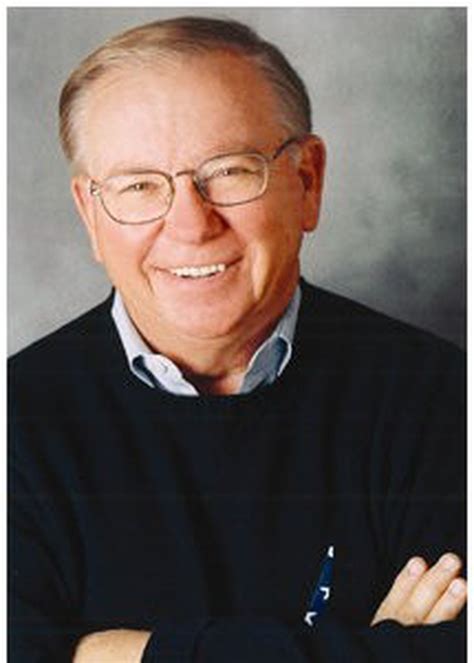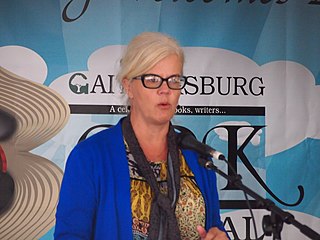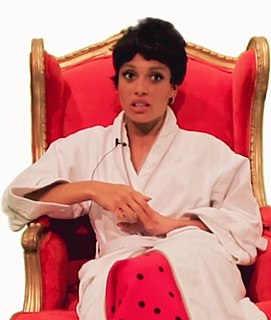A Quote by Virginia Woolf
If we help an educated man's daughter to go to Cambridge are we not forcing her to think not about education but about war? - not how she can learn, but how she can fight in order that she might win the same advantages as her brothers?
Related Quotes
She was the first person on either side of her family to go to college, and she held herself to insanely high standards. She worried a lot about whether she was good enough. It was surprising to see how relieved she seemed whenever I told her how amazing she was. I wanted her to feel strong and free. She was beautiful when she was free.
You must learn her. You must know the reason why she is silent. You must trace her weakest spots. You must write to her. You must remind her that you are there. You must know how long it takes for her to give up. You must be there to hold her when she is about to. You must love her because many have tried and failed. And she wants to know that she is worthy to be loved, that she is worthy to be kept. And, this is how you keep her.
Why does a dad matter so much to a daughter, in particular? A dad is the one who teaches a daughter what a male is all about. It's the first man in her life--the first man she loves, the first male she tries to please, the first man who says no to her, the first man to discipline her. In effect, he sets her up for success or failure with the opposite sex. Not only that, but she takes cues from how Dad treats Mom as she grows up about what to expect as a woman who is in a relationship with a man. So Dad sets up his daughter's marriage relationship too.
I talked to my mother about it a lot. I asked her what it was like to grow up in New York and Harlem in the 1920s and 1930s, and I asked her about a woman leaving her husband. I asked her about how she would feel about that woman, and my mother grew up in the Church Of God In Christ, and she told me that the woman might be isolated because the other women thought she might go and come after their husbands. That's how they thought then.
She'd assumed she'd be married and have kids by this age, that she would be grooming her own daughter for this, as her friends were doing. She wanted it so much she would dream about it sometimes, and then she would wake up with the skin at her wrists and neck red from the scratchy lace of the wedding gown she'd dreamed of wearing. But she'd never felt anything for the men she'd dated, nothing beyond her own desperation. And her desire to marry wasn't strong enough, would never be strong enough, to allow her to marry a man she didn't love.
When I was growing up my mom was home. She wanted to go to work, but she waited. She was educated as a teacher. The minute my youngest sister went to school full-time, from first grade, mom went back to work. But she balanced her life. She chose teaching, which enabled her to leave at the same time we left, and come home pretty much the same time we came home. She knew how to balance.
One of my aunties inspires me beause of how easily she shows her emotions, and she isn't ever afraid to cry. My mum, for her work ethic - she might not show her emotions in public very much, but she's a total power woman. My grandma, who watched four of her children die before her, she's a powerhouse.
One thing about my mother is that she has her taste: She knows what she likes and what looks good. It's not studied. There is no insecurity in what she is going to wear, and I think that translates into effortlessness. Her career has been a steady rise, and it hasn't been about the fashion of the moment. It's been because she has kept to her style. She didn't go grunge when it was grunge, or 70's when it was 70's. It's about being secure with what you like and not worrying about what's in fashion that particular day. That's what I admire about her.
And when she started becoming a “young lady,” and no one was allowed to look at her because she thought she was fat. And how she really wasn’t fat. And how she was actually very pretty. And how different her face looked when she realized boys thought she was pretty. And how different her face looked the first time she really liked a boy who was not on a poster on her wall. And how her face looked when she realized she was in love with that boy. I wondered how her face would look when she came out from behind those doors.
I noted about Cate Blanchett was her very positive lack of concern for how she turns out in Cinderella. She is happy to be a villainess and very pleased to be encouraged as I did with her to reveal this backstory and feel as though this was very human, that this broken heart of hers, if you might regard it that way, would be visible, but she never played for sympathy and I really admired that about her, so she's just there, she just is and uncompromisingly.
Just like Marilyn Monroe is a lot of girls' idol, that's how I feel about Dorothy Dandridge. And she any Marilyn were very close friends. She went through a lot, and people told her that she couldn't do certain things, but she didn't let that bother her. She said in her mind that she was going to do them and that nothing was impossible, and she did it. It was so sad... She died from drugs, and drinking as well.
I knew she was a party girl. The book I liked most on her was called [princess] Margaret: A Life of Contrasts and getting to know her, it was how conflicted her position and her internal life - or self - was. She is so fiercely royal and so fiercely "sister of the queen" or "daughter of the king" because that is her identity and it's all she's ever known. And at the same time she is struggling to push the boundaries and to break away from it, to be different or to modernize the monarchy, to turn it on its head.



































